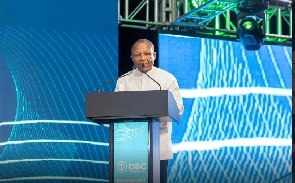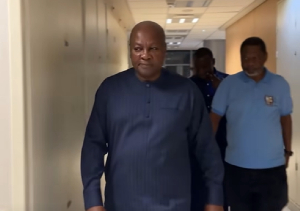Stakeholders in the financial and cassava value chain must step up their collaboration to help promote the cassava sector, the Chief Executive Officer (CEO) of the Development Bank Ghana (DBG), Kwamina Duker, has said.
He said DBG was ready to support bankable and sustainable projects to promote the growth of the cassava value chain to boost the Ghanaian economy.
“We will collaborate with key stakeholders to help fund and support businesses to grow the cassava value chain,” Mr Duker said during a stakeholder’s forum on cassava in Accra yesterday.
It was hosted by the Ghana Incentive-Based Risk Sharing System for Agriculture Lending (GIRSAL), in partnership with Development Bank Ghana (DBG) and the Ghana Industrial Cassava Stakeholder Platform (GICSP).
The maiden Cassava Multi-Stakeholder forum was aimed at congregating participating cassava stakeholders and value chain actors to better understand the challenges in cassava production, processing, and marketing and how they can be mitigated for financing.
GICSP states that cassava is the most important root crop in Ghana and more than 70 per cent of farmers in Ghana produce cassava, and the sector contributes about 22 per cent of agricultural Gross Domestic Product (GDP).
GICSP further states that Ghana ranks among the top five cassava producers in Africa, with an annual average production of 16 million metric tonnes with at least 18 varieties of improved cassava produced in commercial quantities for various uses.
Mr Duker said DBG would help unlock the potentials of the sector, stressing “DBG will do this through our holistic approach to combine finance, capacity building and market development.”
“We will also provide thought leadership on policy development to stimulate a conducive environment for agri-business. We hope that you will embark on this journey with us and together we will see a real transformation for cassava businesses in Ghana that also translate into the economic fortunes of our country,” he said.
Mr Duker said DBG’s mandate was to grow the private sector and unlock growth for the economy, by working constructively with stakeholders to address the finance gap for long term capital in a catalytic way and deliver a beneficial Ghanaian credit market that worked for all stakeholders sustainably.
“DBG focuses on four key sectors: agribusiness, manufacturing, Information Communication Technology (ICT) and high value services. The importance of unlocking value within key agri-value chains cannot be understated. So, that explains why we are here today as a sponsor for this event,” Mr Duker said.
He entreated the players in the cassava value chain to come out with practical suggestions and solutions to address the challenges of the sector.
The CEO of GIRSAL, MrKwesi Korboe, urged the players in the forum to use the opportunity to “demystify the cassava value chain” and come out with solutions to best position the industry.
He said the cassava sector continued to be plagued with challenges in spite of measures pursued by the government and development partners for the past 20 years to revamp the sector.
“I hope today, we will come out practical solutions to address the challenges facing the sector,” MrKorboe said.
The Chairperson of the GICSP, Mr Chris Quarshie, in his remarks said, cassava posed huge potentials for the country, as there was huge demand for cassava and its derivatives such as ethanol, starch on the world market.
“Cassava derivatives such as ethanol, cassava flour, starch and sweeteners produced locally can reduce our imports in the short term by over $400 million annually and increase our exports by another $200 million, rising to $500 million in the medium term,” he said.
He said the country currently produced 18 million metric tonnes of cassava a year and 10 million tonnes were in storage “under the ground.”
Mr Quarshie said cassava contributed over $2 billion to the Vietnam economy in 2021.
“If Vietnam can export $1.5 billion in exports from a national cassava production of 10 million tones, what can we do with our over 10 million tonnes in storage? This is especially poignant when we also consider the following,” he said.
Watch the latest episode of BizTech below:
Business News of Saturday, 19 November 2022
Source: ghanaiantimes.com.gh













